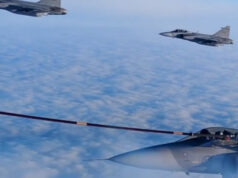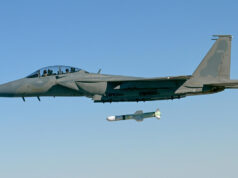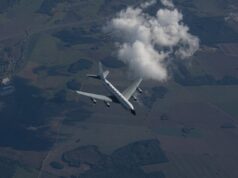Maritime patrol aircraft from France, Norway, and the United Kingdom have been conducting extensive surveillance over the waters off Sligo and Donegal on the west coast of Ireland.
This operation, which has been ongoing for the past week, is in response to suspected Russian submarine activity near gas pipelines and subsea cables.
According to reports from The Sunday Times, the aircraft involved in the operation include a French Bréguet 1150 Atlantic plane, which flew off the Clare coast, and Boeing Poseidon P-8 aircraft from Britain and Norway, which monitored areas off Sligo and Donegal.
These aircraft, especially the Poseidon P-8, are well known for their capabilities in tracking submarines. This coordinated effort underscores the seriousness with which these nations view the potential threat posed by Russian submarines in the region.
The implications for Ireland are quite serious; readers should note that the country’s lack of maritime defence capabilities has necessitated the intervention of its allies.
Ireland’s Strategic Position and Vulnerabilities
Ireland’s position in the North Atlantic places it at the heart of a vast network of undersea fibre-optic cables, which carry about 97% of the world’s communications and internet traffic. These cables are vital for global communications, linking Europe with North America. With over 550 cables spanning 1.4 million kilometres, these infrastructures’ security is paramount for Ireland and the global community.
The suspected Russian activity off the Irish coast is particularly alarming given past incidents. In August 2021, the Russian intelligence ship Yantar was spotted near Ireland’s coast, close to the submarine cable AEConnect-1 and the planned Celtic Norse submarine communications cable route. This pattern of Russian interest in the region’s undersea cables has raised concerns about potential acts of sabotage.
Growing Concerns and Military Responses
European intelligence agencies believe that Russia may be preparing acts of sabotage in EU member states in the lead-up to the European elections. The current NATO surveillance operation is a proactive measure to counter any such threats and ensure critical infrastructure security.
Ireland’s engagement in international military exercises has been noteworthy. Recently, Irish personnel participated as observers in NATO-supported naval activities off the coast of Sesimbra, Portugal. These exercises, which included the use of underwater drones, underscore the potential for international collaboration in securing critical undersea infrastructure.













Reading this something occurred to me what’s needed are shoals of semi, autonomous undersea armed drones part enabled by AI. If I can have this thought, I’m sure it’s already been thought of!
Drones would be good but the area is very large and some considerable persistence is required.
A couple of commercial ships as per our recent purchases would seem to be the ideal, perhaps monitoring some recoverable float-topped sonobouys?
Presume the Irish navy is assisting in this international effort…
AA
Ireland updated its partnership recently for assistance from NATO in such matters. I am not sure what it fully entails but they mentioned air/sea/ undersea assistance for its defence forces.
Switzerland and Austria have ,or are having , their partnership agreements updated.
Ireland is now the worlds largest tax dodging free riding economy and amazingly google now needs the countries it doesn’t pay tax in to provide military protection for its cables so Ireland can dodge even more corporate tax.
The Irish Government are a bloody disgrace.
The Irish navy is providing zero service as it’s not in NATO and Ireland as zero ASW capability.
Yep, Ireland should hook in with us Aussies… the first Ghost Shark XL-AUV autonomous oceanic submersible naval system has been revealed in Sydney Harbour, and the program is more advanced than had been publicly revealed with a significant sea trials program already undertaken.
Together with acquiring a fleet of four P-8A Poseidons like NZ, a comparable country, has done.
Being slightly flippant here, but maybe send the newly available Astute to investigate before something goes “bung”? Hope if anything is going on there that they can be caught and or exposed.
Is there a need for a few more P-8s?
Yes’. Perhaps it will have to wait until after yet another Defence Review by yet another Healey’.
To be honest I’d keep our Boats as far away as possible, in the Littoral waters it’s best done by surface and airborne ASW. It may also explain why HMS Scott left Faslane yesterday, sub sea surveying inc infrastructure is her forte.
Indeed. But what of Proteus? Where is she?
This is not new by any means. The debate about Ireland’s current defence forces is well known and nothing new. But NATO countries feel obliged to do something as said 97% of the worlds communications is sent which could compromise other states. With Russian subs having been frequenting the area for a number of years NATO has no option but to do something. While Ireland may be a neutral country they are freeloading as far as security goes. The RAF provide QRA cover and the RN have on several occasions supported maritime Ops. But yet no cost is attributed to Ireland, at what point does NATO have a conversation with Ireland and ask for payment for services rendered. The last time a Russian vessel was chased, it was the fishermen of Cork!!!!!!!!!! As a country I would be embarrassed that fishermen had to chase away a vessel as while their is a maritime element it cannot put to sea for various reasons. The political will in Ireland is controversial at best with each taking pot shots at each other in Dail and a certain political party wanting the UK forces no where near them. But its OK when TU-160 are flying down the west coast of Ireland, and Russian subs are possibly meddling with comms cables off the coast which could potentially shut them down as well as most of Europe.